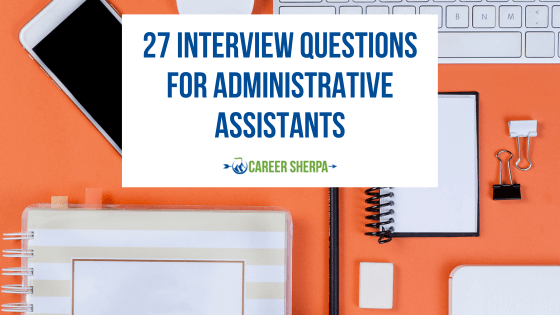If you''re serious about getting hired as an administrative assistant, there are a number of interview questions you need to be ready for. This is such a versatile role that hiring managers often want to learn a lot about you!

This list of the most common interview questions for administrative assistants will help you prepare thoughtful and effective answers that improve your chances of getting hired.
1. What qualities do you think are most important for administrative assistants?
Administrative assistants wear many hats, and their work can greatly impact a company’s success. When an interviewer asks this question, they gauge your understanding of the position and gain more insight into your overall approach.
Ultimately, how you respond sheds light on what facets of the job you prioritize. There are many ways to answer this, but the best response covers key qualities like organization skills, communication, and staying calm under pressure.
When answering, explain why those qualities are crucial to an administrative assistant’s success. Demonstrate that you understand how important the role is and know what it entails.
2. What kind of work environment do you prefer?
All workplaces are different, and employers want to know that the person they hire as an administrative assistant can fit into the established work environment. This is essentially a question about fit. If a company has a high-energy work environment centered around collaboration, hiring someone who prefers to work independently in a quiet setting is not wise.
The best thing you can do is research the company beforehand. Learn about the office environment and reflect on your work experience. Good responses emphasize adaptability.
You can have preferences, but it’s best to indicate that you can succeed regardless of the environment. Explain why you have your preferences and focus on what you know about the company to reassure hiring managers you’ll fit right in.
3. How do you prioritize your work?
Some of the most important skills an administrative assistant can have are good time management and the ability to effectively prioritize their work. The job of an administrative assistant is dynamic. Every day is different, and you’ll take on tasks with varying time commitments.
This interview question for administrative assistants is designed to uncover more about your unique approach to task prioritization. They want to know that you can handle whatever work comes your way while focusing on the most important duties first.
When answering, focus on the support aspect. Your job is to support others and support the needs of the business. The most impressive responses emphasize the importance of understanding business objectives and knowing how an assistant’s work is essential to success.
4. What’s your approach to time management?
This interview question is somewhat similar to the previous one. It revolves around the skill of time management and gives you the chance to show hiring managers that you''re able to get things done (even if there''s a lot on your plate).
There are many approaches to time management. Reflect on how you’ve successfully navigated a busy schedule in the past and discuss what techniques you used.
That could include proper task prioritization, to-do lists, considering how much time every responsibility will take, etc. Walk interviewers through your process. Talk about how you look at your daily schedule and what you do to ensure you finish everything on time and to the quality the organization needs.
5. Tell me about your strengths and weaknesses as a communicator?
Good communication is another must-have quality to become an administrative assistant. The job is ever-changing, and you’ll collaborate with many people to support business objectives.
Administrative assistant interview questions like this encourage you to talk about your strengths while recognizing areas that could use work.
When discussing your strengths, provide real examples. Demonstrate your strengths for the interviewer to reassure them that you can communicate effectively.
For your weaknesses, be honest. However, avoid deal-breaking inadequacies, such as the inability to listen or ineffective phone etiquette. It’s best not to mention anything that could instantly hurt your chances of getting a job offer.
Instead, focus on smaller fixable issues. Then, speak about what steps you’re taking to address them. People can learn to communicate better, so mentioning that you’re actively learning and improving can leave a good impression.
6. Tell me a bit about your work style
Questions about your preferred work style are common in interviews for any position. But your response holds greater weight when you’re trying to land an administrative assistant role. Assistants help multiple people throughout the organization.
Their support is critical to the company’s success, so employers want to find people who can thrive in an already-established work environment.
Do your research to learn more about the office environment. Look at the corporate website, view professional profiles of current employees, and turn to social media. Use that information to mold your answer.
Provide examples of how your preferences align with the company’s work environment.
7. What software do you feel comfortable using?
Administrative assistants rely on many software applications to do their job. Furthermore, assistants may need to have a general understanding of software titles that everyone else uses, even if they won’t need to operate it regularly.
Reflect on your work experience when developing an answer. Before your interview, consider listing applications you’ve used regularly in past jobs.
Discuss your experience using the software during your response and describe your comfort level with them. Be honest. Hiring managers can easily test your proficiency, and the last thing you want is to get caught lying to the interviewer.
The most important thing to include in your response is reassurance that you can easily learn. There’s a good chance the company will have applications you’ve never used before. Mentioning how you quickly learned new software or technology in your last role proves that you’re a fast learner and can quickly pick up software.
8. How do you handle having multiple supervisors at the same time?
Administrative assistants sometimes don’t have a single supervisor to report to. In many cases, this job requires you to work with several leaders in the company. So, how do you prioritize your work and juggle responsibilities given by more than one person?
That’s what hiring managers want to know. This question is about time management, task prioritization, and the ability to be agile. Working with several supervisors can be challenging, but the best candidates can handle it without breaking a sweat.
If you have experience with this scenario, provide examples. Lean into the skills you used and the positive results that followed. If you don’t have experience, the best thing you can do is provide examples of how you’ve stayed on top of several duties simultaneously.
9. Share a time when you made a mistake at work and what you did to correct it.
Mistakes happen! No one is perfect, and employers don’t expect you to be. However, they expect you to be responsible and professional when errors occur.
This interview question for administrative assistants requires a bit of thought before you can come up with a strong answer. Interviewers ask it to learn more about how you navigate these situations and to gain more insight into your moral compass.
Anyone can attempt to sweep things under the rug. However, the best candidates are honest and actively address mistakes as they come.
Provide an example of a past mistake and how you responded. How did you minimize the effects of that faux pas, and how did you approach bringing up the issue with supervisors? The most important part of your answer is to explain what you learned from that mistake. This reassures the interviewer that you won''t let it happen again. Always end on the positive outcome and reiterate that you have the moral code to do the right thing.
10. Why do you want to work here?
Interviewers ask this question to ensure you’re there for the right reasons. Your response can also demonstrate that you understand the role and did your research to learn about the company.
Employers want people who want to work for them while taking their jobs seriously. It is a big red flag if you say anything indicating that you’re only there for a paycheck.
Research the company and understand why the organization appeals to you. Find a few details about the company’s mission or history. Then, think about your career trajectory and goals.
When answering, connect everything you learn to reassure interviewers that you’re committed to doing a fantastic job. Provide reasons for why you chose to apply to this specific company and not its competitors.
11. What tools do you use to stay organized?
Good organizational skills are paramount for administrative assistant roles. You’ll be responsible for many things. In addition to handling some of the smaller administrative duties, you might work with leaders, manage projects, etc.
This administrative assistant interview question gives you the opportunity to put your organizational skills on display. Walk interviewers through your approach and discuss the unique tools you use to stay on track daily.
Many assistants rely on software applications to build schedules, prioritize tasks, and more. Talk about what you do and explain why you prefer to use the tools you like.
12. What management style do you prefer?
Here’s another fit-based question. But unlike other similar questions you might hear, this one also gives interviewers a better idea of your ability to be independent.
Administrative assistants may have multiple supervisors, and the management style of every company is unique. Your response will help hiring managers see how you would fit into the role and respond to the specific management style employed at the company.
Furthermore, it sheds light on your ability to self-start and be independent. Administrative assistants need to have enough independence to keep the office running smoothly. That’s the entire job.
However, they should also have no problem getting managed by company leaders.
Be honest and provide examples of previous management styles you’ve experienced. Then, talk about the independence aspects. For example, you can say that you prefer a manager who sets clear expectations and trusts you to complete your tasks.
13. Do you have experience setting schedules?
Creating and managing other peoples’ schedules is a core responsibility for an administrative assistant. While it seems easy enough on the surface, it’s a challenging, hard skill. Interviewers want to know that you have experience scheduling others and how to prioritize meetings or deadlines that need to take precedence.
The best way to respond to this question is to provide examples of successful scheduling from your past. You can also discuss your process and the mass scheduling tools you’ve used.
14. Do you have experience handling confidential information
Administrative assistants may have access to a breadth of confidential information. That may include employee data, financial information, client files, trade secrets, and more. Many companies will have strict contracts prohibiting you from bringing or discussing that information without proper authorization.
However, hiring managers still want to ensure candidates have experience handling private information.
The best way to respond is to detail your experience. Discuss the types of information you’ve dealt with previously and what strategies you used to keep it safe.
15. What do you do if you’re having trouble with a particular task or project?
Questions like this give interviewers more insight into how you handle complex tasks without clear instructions. With how dynamic the job of an administrative assistant is, you’ll encounter projects you struggle with. That’s the nature of the job.
Interviewers want to know that you are proactive about finding solutions. Whether that’s through researching the problem on your own or turning to someone with more experience, they want people who will not put off on their work because they don’t understand a task. They want assistants who will ask for clarification when needed and work to find a solution.
When answering, fall back on previous work experience and provide a real example. Detail the issue, discuss what you did to solve it, and end with a positive outcome. You can also emphasize what you learned and how you successfully navigated similar issues moving forward.
16. What’s your approach to learning something new?
This interview question for administrative assistants is similar to the previous one, but it focuses more on your ability to learn new things so you can continue supporting the organization. It’s common for companies to adopt new technologies or introduce innovative software. Hiring managers want to know that you can quickly learn new things so that you’re able to maintain productivity and assist others whenever necessary.
Think about your past jobs and moments when you had to learn something completely new. Detail your approach to gaining proficiency. The best examples include moments when you read through manuals, took classes, or earned certifications to improve your understanding of an application or concept.
17. What do you do if you receive work that you feel is unnecessary?
Being an administrative assistant is like having any other job within the organization. Sometimes, you’ll get tasks you don’t feel are necessary.
The important thing with this interview question is that you show you can communicate and compromise.
As always, fall back on real examples if you have them. There are many ways to approach these situations, but the best involves speaking with your supervisor to understand why a task is necessary. Showing you can communicate to learn more and understand the importance of your work goes a long way.
18. What trends do you think will influence administrative assistants in the future?
Administrative assistant interview questions like this show your dedication to career development.
Do your research before your interview! The worst way to answer this question is to say, “I don’t know.” Industries evolve, and the work of an administrative assistant is no different.
Having a few trends to talk about shows that you’re serious about your job and care about staying updated on the latest trends that will impact you and the company you work for. You can discuss upcoming software that you believe will improve efficiency, new approaches that some companies are adopting, or the weight of AI in the workplace.
The key is to have something to discuss to show you have your finger on the pulse.
19. What unique skills do you have that make you a great administrative assistant?
This question is a roundabout way for interviewers to ask about your strengths. It’s your chance to discuss your skills and what you’re bringing to the table.
A good response will show good self-awareness. It’ll also highlight what motivates you and what you believe is most important for the job.
Think about what has brought you the most success as an administrative assistant. Give an example of those skills in action and detail how they’ve helped your career. Then, mention how those skills will benefit the company if you’re hired.
20. What did a typical day look like for your current/previous job?
Interviewers ask this question to learn more about your experiences and better understand what types of work you’ve done. Being an administrative assistant at one company can look completely different from the same role at another.
Go over your core responsibilities and walk the interviewer through a typical day. Mention the skills you employed most, discuss how you stay organized, and provide as many details about your work as possible without running too long.
21. Explain how an administrative assistant impacts a company.
Administrative assistants have an important job, and interviewers use this question to ensure you understand it. Assistants do many things, but their ultimate goal is to keep an office running smoothly. Their work can have a huge impact on an organization’s success.
Without a great administrative assistant, things can fall apart quickly. The best way to answer is to recognize those facts and demonstrate that you understand how critical this position is to the company’s day-to-day and long-term success.
Provide an example of how your work as an administrative assistant makes a difference.
22. What administrative tasks do you have the most experience with?
This interview question for administrative assistants is similar to other experience-based questions. But instead of asking you outright about specific skill sets, this question invites you to discuss your experiences more organically. It’s an open-ended opportunity to talk about what you feel is most important in your work history, and you have the chance to put your best foot forward.
Focus more on your strengths. Think about the tasks you did most at your previous job. Discuss a time you successfully completed that type of task and the positive impact it made.
23. How do you deal with difficult coworkers or clients?
Administrative assistants often have to deal with difficult people like any other job. They can be in-house, presenting challenges every day. Or, you might interact with a less-than-pleasant customer.
Whatever the case, you must know how to handle those situations and resolve problems independently.
The best way to respond is to provide an example from your previous roles. Discuss the issue you faced with a difficult customer or colleague and detail how you approached the situation. Walk the interviewer through the resolution process.
Most importantly, emphasize your ability to remain professional.
24. Tell me about a difficult project you were involved with in the past and how you approached it.
Challenging projects will arise at some point, and employers want to know that you can navigate obstacles to maintain productivity and be successful.
This interview question is about showing off your ability to solve problems. To do that, refer to tough experiences from your past. Focus on a difficult project or duty that was more difficult to complete than you thought.
Tell the interviewer how you approached that situation and what you did to complete the project successfully. Always emphasize the positive outcome and what you learned from the experience.
25. Why did you leave your last job?
It’s common for interviewers to inquire about your last job and why you left. These questions come up because they want to understand why you’re there. Your response will also provide more insight into the type of employee you are.
You want to give the interviewer piece of mind that this job won’t be temporary. A good response will show that you’re a professional and serious about success in this role.
Be honest and avoid referring to former employers or colleagues in a negative light. Instead, mold your answer around the prospect of a new challenge or the desire to advance your career.
26. What keeps you motivated?
Repetitive work is normal as an administrative assistant. While the job is dynamic, you’ll spend considerable time doing the same work repeatedly. Interviewers want to know how you keep yourself motivated, even when feeling down or frustrated.
When you respond, tell the interviewer what you do to keep your work exciting. If you have creative ways to break up monotony, talk about them.
You can also highlight your natural motivations to succeed, such as career development. Hiring managers want to see that your motivations go beyond a paycheck, so focus on other rewards this job provides.
27. Do you have any questions for me?
Interviewers often end with this question. It doesn’t matter if you’ve gained tons of information during your meeting. Always have questions to ask!
Asking questions shows you’re truly interested in this role and passionate about the opportunity. There are many questions you can ask.
Pay attention during the interview and inquire about anything not covered during your discussion. That could be about growth opportunities, day-to-day responsibilities, etc. It’s best to avoid salary or benefits questions until after you get a job offer, but you can ask for more details about the job itself.
Conclusion
These interview questions for administrative assistants come up all the time, so it''s important to be ready for them. So as always, our recommendation is to spend some time working on your answers for any that gave you trouble.
You''ll be glad you did!
The post 27 Interview Questions For Administrative Assistants appeared first on Career Sherpa.









